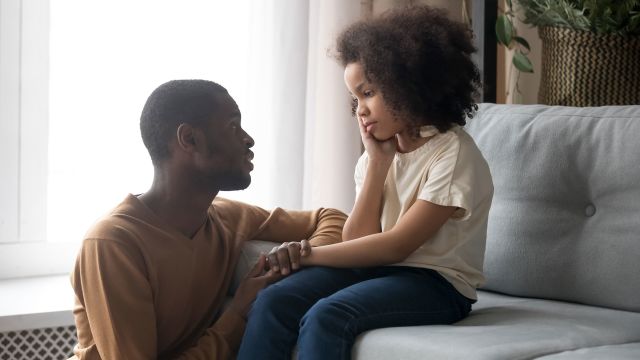Updated on July 16, 2020.
If the hoarding of hand sanitizers and frustration with everythign from cancelled plans to the need to wear face masks are any indication of how adults are coping with the COVID-19 outbreak, it’s important to remember that all this fear, disappointment and uncertainty can also weigh heavily on the minds of children.
Kids are not immune to concerns about infection or illness, particularly in a world where media reports and social media rants are just a click or finger swipe away. In many cases, young people can also pick up on the anxiety of the adults they rely on and trust.
In short, if you’re at all worried about COVID-19, it’s safe to assume your kids are, too.
“Children are receiving messages about COVID-19 from so many sources, some likely more credible than others,” says Michael S. Mitchell, MD, medical director of the pediatric emergency department at Brenner Children's Hospital and assistant professor of emergency medicine at Wake Forest Baptist Health in Winston-Salem, North Carolina. “I would strongly urge parents to initiate age-appropriate conversations with their children.”
But even if you’d like to help put your kids’ minds at ease, knowing what—and how much —to say about the new coronavirus may seem difficult since research is ongoing and there are still a lot of unknowns.
Starting the conversation
When speaking to kids about COVID-19, take your cues from them, advises licensed psychologist Linda Nicolotti, PhD, section head, pediatric psychology and behavioral health at Wake Forest Baptist Health.
“Let children guide the discussion by addressing what they have heard or seen, their feelings, and their questions,” says Nicolotti.
Asking children what they are hearing about the disease from various sources also gives you an opportunity to dispel any myths that could incite undue worry or fear, adds Dr. Mitchell.
When determining how much detail kids should hear about the pandemic, take their ages into consideration, Nicolotti recommends. This means a conversation you have with a teenager may be very different from the talk you have with a younger child.
“Present information that is developmentally appropriate in a calm manner,” Nicolotti says. For example, speak with younger children at eye level with a gentle voice, using simple words they can understand. Older kids and teens, on the other hand, may need more facts and reassurances to help them regain a sense of control.
Helping kids cope and feel safe
Children react differently to anxiety and stress than adults. In some cases, kids may hide their feelings or not respond immediately, making it more difficult to know if they’re worried or upset. When talking to your children about the new coronavirus, the following strategies can help you not only allay their concerns but also empower them to protect themselves and others:
Educate yourself first. The best antidote for the fear of the unknown is information. “The facts can be reassuring,” Nicolotti explains.
Before you can be open and honest with your children, you need to become informed yourself. Most cases of COVID-19 are mild. Current estimates suggest that about 16 percent of cases result in severe illness and complications. Fewer still, about 5 percent, will develop very serious issues. That means tens of thousands of people around the world have already recovered from the infection—far surpassing the number of confirmed deaths.
And while kids are not immune to COVID-19, researchers investigating the effects of the coronavirus on the body have found that young people who do become infected tend to develop mild cases. Meanwhile, reports of serious complications among children are rare, according to the U.S. Centers for Disease Control and Prevention (CDC).
“Preliminary studies suggest that children have less severity than adults with novel coronavirus,” says Mitchell. “Why this particular novel virus has not caused severe disease in children during this current outbreak is unknown.”
Mitchell notes, however, the effects of this virus on children is still under investigation and parents should still vigilantly monitor kids and be aware of any symptoms, such as coughing, fever, shortness of breath, fatigue, sore throat, headache and diarrhea. If you believe your child may have been exposed to COVID-19, call your pediatrician to report their symptoms and receive instructions on what to do next.
Don’t dismiss or discount their worries. Kids’ feelings about COVID-19 should be validated—not brushed aside, Nicolotti says. Even if your intentions are good, telling anxious kids not to worry isn’t an effective approach.
Listen to your children. Ask them if they have any questions and let them know that it’s okay to be sad or worried and to express those feelings. Children who are hesitant to talk about how they are feeling may be more comfortable drawing or putting their thoughts on paper.
Empower them to protect themselves. Teaching children how they can reduce their risk for infection will give them a sense of control over the situation as it develops.
“We can support them by educating them about how to help prevent further spread of this disease by promoting good hand hygiene, sneezing into your arm and not sharing food and drinks with friends,” Mitchell advises. “These recommendations still stand as our best defense.”
Washing your hands well and often with soap and water for at least 20 seconds is one of the most effective ways to protect yourself against COVID-19. Kids should be instructed to avoid touching any part of their face, including their eyes, nose or mouth with unwashed hands.
Adults may have trouble not touching their faces with potentially contaminated hands. So, reminding kids to do the same will likely require constant effort. Mitchell notes that older students could also carry hand sanitizer with them to school and use it on their hands frequently when they don’t have immediate access to soap and water.
Shift the focus to the positives. Amid the steady stream of ominous headlines and media reports, it’s also important to point out that doctors and scientists around the world are working hard to keep everyone safe. If your child seems to be overly anxious about COVID-19, speak to your pediatrician about other steps you can take to help ease this stress. Some children may benefit from the added support of a trained psychologist or counselor.
Limit exposure to news coverage and social media. Being informed about the new coronavirus and how to help curb its spread is important but excessive consumption of information about COVID-19 may overload or overwhelm children, advises Nicolotti. Kids need some time away from reminders about the outbreak.
“Repeated exposure to distressing information and images in the news can exacerbate anxiety,” Nicolotti says. “For children and adolescents with access to social media, discuss with them how they can limit social media exposure to coronavirus information and why this is important to do.”
Being mindful about what children are listening to at home or in the car is also important. And don’t let coronavirus discussions completely take over family time.
Set a good example. In helping children understand and manage their concerns about COVID-19, taking steps to manage your own anxiety (and not just pretend everything is okay) is essential. Kids take their cues from their parents and caregivers, Nicolotti points out. So, be sure to model a healthy routine, eating healthy meals, getting enough sleep and exercising regularly. Doing so will not only help alleviate stress but also help support the immune system.
Stick to normal routines as much as possible. It remains unclear how disruptive the outbreak will be for Americans as well as those living in other countries around the world. Large-scale gatherings may be cancelled or postponed. Parents may be forced to telecommute. Hospitals and urgent care centers may be burdened with a high volume of patients who need care at the same time. Schools and daycares may close due to infection and attempts to halt the spread of the coronavirus. As events unfold, try to maintain your normal routines as much as possible, including consistent times for homework, playing, family dinners and bedtime.
Remember, when talking to children about COVID-19, information should be relayed in manageable doses to avoid overwhelming kids with too much information at once, Nicolotti adds. And keep the lines of communication open as the situation develops.






